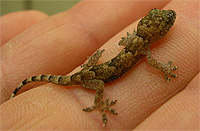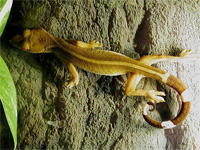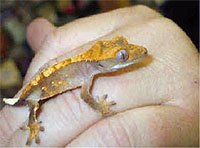Caring for Geckos
Geckos are small lizards. While all geckos are lizards, not all lizards are geckos. They do, however, make excellent pets and comprise about one half of all the reptiles in the world. On the average, they live between 20-25 years and grow up to eight to 10 inches in length. Their size depends on their breed and they come in a variety of shapes and colors. While geckos are not quite as social as a dog or a cat, it can be quite rewarding to own one. Due to their long lifespan, owning a gecko is a significant commitment and should not be taken without understanding the responsibilities involved. Caring for a gecko can be quite easy if the proper steps are taken.

Housing a gecko is simple. A reptile cage or at least a 10-gallon tank is fine for one gecko; twenty gallons is better for up to three geckos. Line the cage or aquarium with newspaper, sand, bark chips (not cedar), indoor/outdoor carpeting, or special sand-like material that is available through a pet supplier. Whatever you decide to use needs to be absorbent, easily cleaned, and digestible if swallowed. Hiding and climbing spaces should be provided as well. These can be rocks, pieces of wood, small boxes, etc. The cage must have a tight-fitting closure to prevent escape and smooth surfaces to prevent irritation to the skin. Many people like to have their gecko roam free in the home due their appetite for insects. Unfortunately, a gecko running around free often dies of hypothermia, hides, escapes or falls prey to dog and cat attacks.
Geckos do not need special lighting. You may want to install a light bulb so your gecko stands out; however, heat is much more important to your gecko's health than lighting. The tank should have a range of temperatures to allow your gecko to move around and select the most comfortable spot. Anywhere between 80-95 degrees should be warm enough for any breed. Heat can be provided with an overhead heat lamp, a heated rock or pad, or both. Light should really only be provided during the daytime with lights out at night. The humidity of the cage needs to be 50-70 percent with adequate ventilation to prevent bacterial growth.

The best diet is live crickets and/or mealworms, which can both be purchased at a pet supply store. It is important to provide additional vitamins and minerals (calcium and vitamin D) with a dusting of a pre-measured mix applied to the live cricket. This provides essential nutrition. Geckos also need a water supply. They like to lick water from leaves, so it can be beneficial to create a drip system that provides a constant source of water.
It is not recommended to keep more than one lizard in the tank. Having two or more together (especially males) often causes competition for dominance and food. This creates stress that can make one or both of them sick. Handling a gecko can also cause stress. While most have been raised in captivity and are used to being held, reptiles do not particularly enjoy human contact. When you do handle your gecko, never hold it by the tail as it can easily break off.

Like other reptiles, geckos can excrete Salmonella bacteria, making proper hygiene essential. Disinfect and clean cages regularly, but do not do so in food preparation areas (kitchens) or bathing areas. Wash your hands/equipment between pets, after handling, and before eating or handling food.
[ Search Articles ] [ Article Index ]
